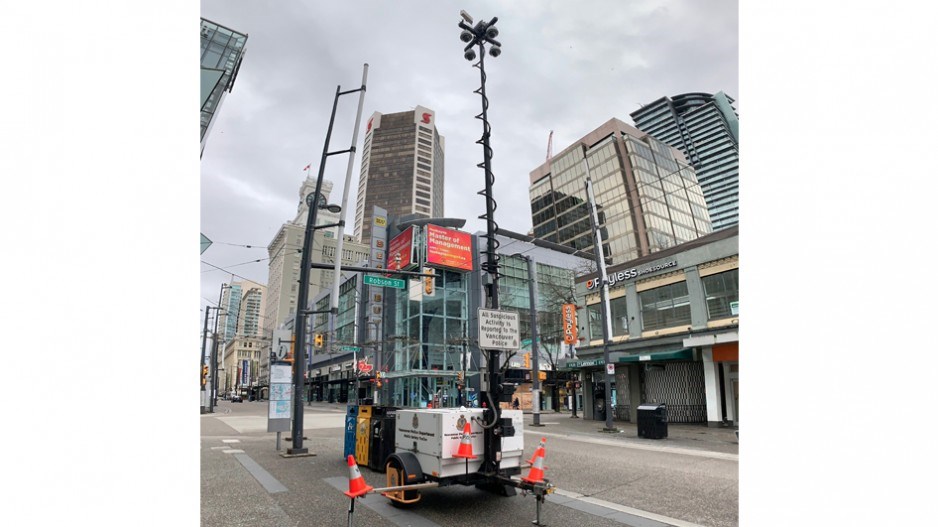A Chinatown resident is suing the Vancouver Police Department for alleged unlawful mass surveillance.
Karina Papenbrock-Ryan asserts in her BC Supreme Court notice of civil claim that surveillance trailers integrate video recording, infrared recording (heat detecting) and LIDAR (Light Detection and Ranging) technology, which is a powerful form of low-intensity laser that allows the user to see through walls, inside buildings or vehicles or under clothing.
Papenbrock-Ryan asserts her image, location and other personal information has been captured by the surveillance trailers in an unlawful manner given she provided no consent to VPD.
“In addition to being within the scope and field of the cameras, the Plaintiff was deterred from using public and private space within the scope and field of the cameras because she did not want to be under surveillance. There was no factual basis for surveilling the Plaintiff,” contends her lawyer Jason Gratl, of Gratl and Co. on East Cordova Street, near Papenbrock-Ryan’s residence.
Papenbrock-Ryan is seeking punitive damages, aggravated damages and an injunction against VPD “to refrain from erecting and using Mass Surveillance Units, including Mass Surveillance Unit Trailers, without prior judicial authorization.”
Gratl states there is no law or regulation authorizing the deployment of these mobile surveillance trailers that VPD calls “public safety trailers.”
Furthermore, whether or not the police actively gather and store Papenbrock-Ryan’s information, the use of this technology still infringes on her privacy rights under the Canadian Charter of Rights and Freedoms, stated Gratl.
“The infringement of [section 8 of the Charter] arises from the absence of law or regulation authorizing the deployment of Mass Surveillance Unit Trailers, or, if there is such a law or regulation, such law or regulation is unreasonable and should be declared to be of no force and effect.”
Gratl argues the use of the trailers do not target a specific crime and are not part of a stated criminal investigation. As such, their use “has a disproportionate negative infringement of privacy.”
Gratl argues further, “There is no evidence that crime is generally deterred or crime rates are generally reduced by mass surveillance; at best crime is displaced. Furthermore, “Deployment of MSU Trailers has decreased public safety by diverting effective police resources to purchase, deploy and maintain MSU Trailers.”
VPD has not responded to the June 5 filing and does not comment on active court cases.
Lately, the camera trailers have reportedly been stationed in Chinatown and along Robson and Granville streets. Police have cited concerns about property crime.
The lawsuit comes as police are under significant public scrutiny for their growing budgets and allegations of excessive force, particularly against minorities. The scrutiny stems from the May 25 death of George Floyd, a black Minneapolis resident who died after a police officer put a knee to his neck for a prolonged period of time.
A 2014 report from the VPD Organized Crime Section describes a purchase request for the camera trailer, built by Ensol Systems in Surrey and costing about $70,000.
In the following two years the camera trailers have raised concerns about privacy from the public.
“The VPD was advised by the Privacy Commissioner of British Columbia, the Privacy Commissioner of Canada and its own legal counsel and policy advisors that deploying the MSU Trailers without reasonable grounds for surveillance would be unlawful but the VPD deployed the trailers despite that advice,” the claim states.
According to the B.C. Office of the Information and Privacy Commissioner’s 2014 Public Sector Surveillance Guidelines report “British Columbians are increasingly subject to routine and random surveillance of their ordinary, lawful public activities by public and private bodies.
“As surveillance increases, so do the risks of harm to individuals. Video and audio surveillance systems are particularly privacy intrusive measures because they often subject individuals to continuous monitoring of their everyday activities.”
OIPC states, “A public body should use a video or audio surveillance system only where conventional means for achieving the same objectives are substantially less effective than surveillance and the benefits of surveillance substantially outweigh any privacy intrusion. Cost-savings alone are not sufficient justification to proceed with a surveillance system under FIPPA.”
OIPC also states how police camera surveillance does not reduce crime.
“Surveillance systems are more effective as investigative tools than as deterrents. There is a common belief that the presence of a camera is an effective deterrent of crime and disorder, however, studies have shown that this deterrence is shortlived.”
VPD announced plans to deploy drones in May 2019 and said it would keep privacy concerns top of mind.
“We have no desire, no interest in looking in your windows,” Superintendent Michele Davey stressed at the Policing Info World conference at Kwantlen Polytechnic University in Richmond in May 2019. “We have a desire to be completely transparent with our drones.”
At that time, then B.C. Civil Liberties Association executive director Josh Paterson said the civil society group had no objections to police using the drones for the stated purposes.
But, Paterson cautioned, the drones must be used lawfully to avoid breached Charter of Rights and Freedoms protections.
Paterson said it’s important that regulations against “indiscriminate mass surveillance” are strict. He also suggested image-retention restriction periods, public notices ahead of drone use as well as auditing of drone usages.




